Czy nauka wyklucza istnienie osobowego boga i czy wiara w niego jest kompatybilna z ewolucją?
Does Science Rule Out a Personal God? Is Faith Compatible with Evolution?
Author(s): John F. HaughtSubject(s): Philosophy, Special Branches of Philosophy, Philosophy of Religion, Philosophy of Science
Published by: Towarzystwo Naukowe KUL & Katolicki Uniwersytet Lubelski Jana Pawła II
Keywords: science; religious faith; conflict; contrast; convergence
Summary/Abstract: This text lays out three distinct ways in which people who have been exposed to science are now responding to the following questions: “Does science rule out a personal God?” and “Is faith compatible with evolution?” The first kind of response claims that the natural sciences and religious faith are mutually exclusive. This is the conflict position. Its representatives include two main subgroups: (1) skeptics who believe that the natural sciences have made all religious claims unbelievable, and (2) people of faith who refuse to accept certain scientific ideas such as Big Bang cosmology and biological evolution. However, in the present text conflict refers only to scientific skeptics, those who claim that scientific method and discoveries now make religious faith and theology obsolete.A second type of response to the questions listed claims that science and faith are each concerned with different levels or dimensions of reality. Science and theology, according to this approach, ask completely different kinds of questions, and so it makes no sense to place them in competition with each other. The contrast approach, as we call it, maintains that there can be no real conflict between the claims of natural science and those of faith and theology. Contrast insists that faith and science are not competing for some common goal, so they cannot come into conflict with each other.A third approach is that of convergence. It might also be called “consonance,” “cooperation,” “contact,” or “conversation.” Convergence agrees with the contrast approach that religious faith and natural science are distinct ways of understanding the world, but it argues that the two inevitably interact. Convergence promotes this interaction. Its objective is to arrive at a synthesis in which both science and faith keep their respective identities while still relating closely to each other in a shared pursuit of intelligibility and truth. Convergence assumes that scientific discoveries matter to faith. In other words, scientific findings can make a significant difference in how we think about God and the meaning of our lives. Convergence wagers that science and faith, as long as they are not confused with each other, can together continue to a richer view of reality than either can achieve on its own.
Journal: Roczniki Filozoficzne
- Issue Year: 68/2020
- Issue No: 4
- Page Range: 21-49
- Page Count: 29
- Language: Polish

